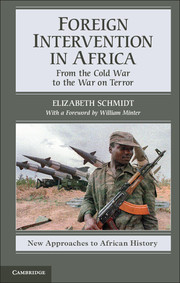Book contents
- Frontmatter
- Contents
- Illustrations
- Acknowledgments
- Foreword
- Abbreviations
- MAP 0.1. Africa, 1947. (Map by Philip Schwartzberg, Meridian Mapping, Minneapolis.)
- MAP 0.2. Africa, 2011. (Map by Philip Schwartzberg, Meridian Mapping, Minneapolis.)
- Introduction
- 1 Nationalism, Decolonization, and the Cold War, 1945–1991
- 2 Egypt and Algeria Radical Nationalism, Nonalignment, and External Intervention in North Africa, 1952–1973
- 3 The Congo Crisis, 1960–1965
- 4 War and Decolonization in Portugal's African Empire, 1961–1975
- 5 White-Minority Rule in Southern Africa, 1960–1990
- 6 Conflict in the Horn, 1952–1993
- 7 France's Private African Domain, 1947–1991
- 8 From the Cold War to the War on Terror, 1991–2010
- Conclusion
- Index
- References
1 - Nationalism, Decolonization, and the Cold War, 1945–1991
Published online by Cambridge University Press: 05 February 2013
- Frontmatter
- Contents
- Illustrations
- Acknowledgments
- Foreword
- Abbreviations
- MAP 0.1. Africa, 1947. (Map by Philip Schwartzberg, Meridian Mapping, Minneapolis.)
- MAP 0.2. Africa, 2011. (Map by Philip Schwartzberg, Meridian Mapping, Minneapolis.)
- Introduction
- 1 Nationalism, Decolonization, and the Cold War, 1945–1991
- 2 Egypt and Algeria Radical Nationalism, Nonalignment, and External Intervention in North Africa, 1952–1973
- 3 The Congo Crisis, 1960–1965
- 4 War and Decolonization in Portugal's African Empire, 1961–1975
- 5 White-Minority Rule in Southern Africa, 1960–1990
- 6 Conflict in the Horn, 1952–1993
- 7 France's Private African Domain, 1947–1991
- 8 From the Cold War to the War on Terror, 1991–2010
- Conclusion
- Index
- References
Summary
This chapter introduces the major external actors in Africa during the periods of decolonization and the Cold War, examines their motives for intervention, and summarizes the book's case studies. The primary foreign participants in the decolonization process were the European imperial powers: France, Britain, Portugal, and Belgium. Italy, which lost its colonies in the aftermath of World War II, played a lesser role. The key players during the Cold War were the United States, the Soviet Union, the People's Republic of China, and Cuba.
Imperial Actors
As anticolonial agitation swept across Africa in the postwar period, the major imperial powers – France, Britain, Belgium, and Portugal – were forced to respond. Their strategies and policies varied, depending largely on their political and economic circumstances. All the colonial powers faced nationalist resistance, and none agreed without internal pressure to grant independence to their colonies. Most anticolonial movements used nonviolent tactics, although some waged armed struggles for national independence. During the first postwar decade, France and Britain responded to political challenges with repression. Armed uprisings in Madagascar, Tunisia, and Cameroon were brutally suppressed by the French, as were anticolonial activities in Côte d’Ivoire and other overseas territories. Britain employed draconian methods to end the Mau Mau insurgency in Kenya and did enormous harm to the civilian population that lived in rebel-controlled areas. Under duress, both France and Britain ultimately acceded to African demands for independence, confident in their ability to transfer political power to African governments that would protect their economic and political interests.
- Type
- Chapter
- Information
- Foreign Intervention in AfricaFrom the Cold War to the War on Terror, pp. 18 - 33Publisher: Cambridge University PressPrint publication year: 2013

